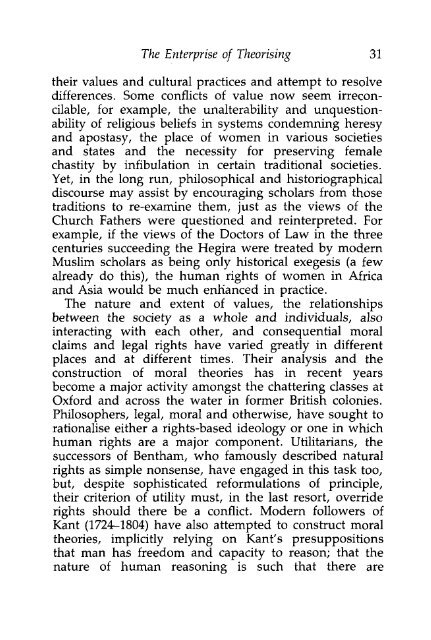The United Kingdom and Human Rights - College of Social ...
The United Kingdom and Human Rights - College of Social ...
The United Kingdom and Human Rights - College of Social ...
Create successful ePaper yourself
Turn your PDF publications into a flip-book with our unique Google optimized e-Paper software.
<strong>The</strong> Enterprise <strong>of</strong> <strong>The</strong>orising 31<br />
their values <strong>and</strong> cultural practices <strong>and</strong> attempt to resolve<br />
differences. Some conflicts <strong>of</strong> value now seem irreconcilable,<br />
for example, the unalterability <strong>and</strong> unquestionability<br />
<strong>of</strong> religious beliefs in systems condemning heresy<br />
<strong>and</strong> apostasy, the place <strong>of</strong> women in various societies<br />
<strong>and</strong> states <strong>and</strong> the necessity for preserving female<br />
chastity by infibulation in certain traditional societies.<br />
Yet, in the long run, philosophical <strong>and</strong> historiographical<br />
discourse may assist by encouraging scholars from those<br />
traditions to re-examine them, just as the views <strong>of</strong> the<br />
Church Fathers were questioned <strong>and</strong> reinterpreted. For<br />
example, if the views <strong>of</strong> the Doctors <strong>of</strong> Law in the three<br />
centuries succeeding the Hegira were treated by modern<br />
Muslim scholars as being only historical exegesis (a few<br />
already do this), the human rights <strong>of</strong> women in Africa<br />
<strong>and</strong> Asia would be much enhanced in practice.<br />
<strong>The</strong> nature <strong>and</strong> extent <strong>of</strong> values, the relationships<br />
between the society as a whole <strong>and</strong> individuals, also<br />
interacting with each other, <strong>and</strong> consequential moral<br />
claims <strong>and</strong> legal rights have varied greatly in different<br />
places <strong>and</strong> at different times. <strong>The</strong>ir analysis <strong>and</strong> the<br />
construction <strong>of</strong> moral theories has in recent years<br />
become a major activity amongst the chattering classes at<br />
Oxford <strong>and</strong> across the water in former British colonies.<br />
Philosophers, legal, moral <strong>and</strong> otherwise, have sought to<br />
rationalise either a rights-based ideology or one in which<br />
human rights are a major component. Utilitarians, the<br />
successors <strong>of</strong> Bentham, who famously described natural<br />
rights as simple nonsense, have engaged in this task too,<br />
but, despite sophisticated reformulations <strong>of</strong> principle,<br />
their criterion <strong>of</strong> utility must, in the last resort, override<br />
rights should there be a conflict. Modern followers <strong>of</strong><br />
Kant (1724-1804) have also attempted to construct moral<br />
theories, implicitly relying on Kant's presuppositions<br />
that man has freedom <strong>and</strong> capacity to reason; that the<br />
nature <strong>of</strong> human reasoning is such that there are

















